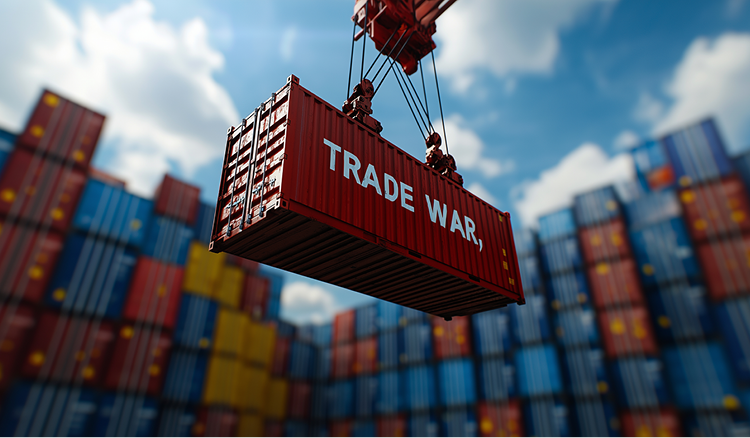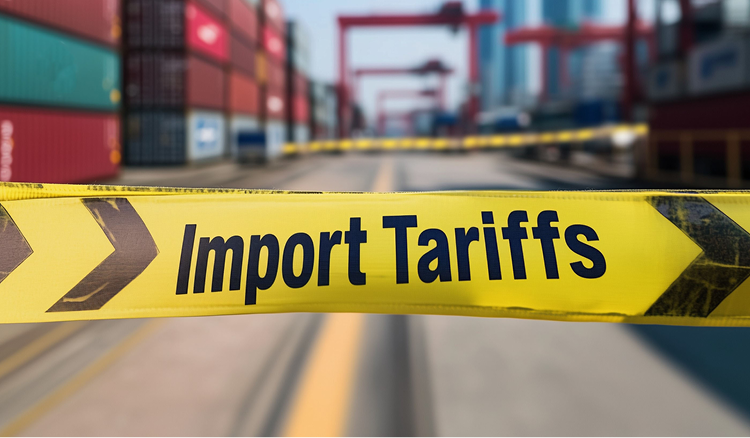Trump 2.0 Week 10 Recap: New Tariff-Related Developments That Manufacturers and Distributors Should Know About About
In this week’s recap, we’ll discuss:
- New 25% Tariff on Imported Vehicles
- New 25% Tariff on Countries Importing Venezuelan Oil
- Sector-Specific Tariff Timing
- The Push For TCJA Permanency
- Trump & Xi Meeting On The Horizon
- New Reshoring Announcements
- EU Concessions
If you didn’t read last week’s article and need to catch up, click here.
New 25% Automotive Tariff
Without a doubt, the biggest new development from this week was President Trump’s decision to implement a 25% tariff on imported vehicles on April 2nd, which he announced on Wednesday at a press conference.
This 25% tariff will be applied to all imported sedans, SUVs, crossovers, minivans, cargo vans and light trucks, as well as key automobile parts. Additionally, the proclamation includes a process to expand the tariffs on parts if needed.
The reasoning for this tariff is that it would help boost domestic vehicle production and reduce the vehicle trade deficit, which soared to over $95.1 billion in 2024.
Additionally, the Trump administration believes that this tariff could help reduce the national debt, and they estimate that this tariff alone could generate anywhere from $600 billion to $1 trillion over the course of the next few years.
For context, 31.8% of cars, and 20.9% of light truck sales in 2024 were imports.
Also important to know, is that importers under the United States-Mexico-Canada Agreement (USMCA) will be able to designate the U.S. content in their vehicles, and systems will be implemented to ensure the tariff only applies to the value of the non-U.S. content. Secretary of Commerce Howard Lutnick, in consultation with U.S. Customs and Border Patrol (CBP), has been tasked with overseeing the development of this process. Until this system is established however, USMCA-compliant parts will remain tariff-free.
While many are warning that these tariffs will raise prices for consumers, Trump has repeatedly warned automakers not to raise prices, which has led them to speculate that there might be punishments imposed by the administration should they choose to do so. Either way, this tariff will provide a significant boost for domestic manufacturers and the U.S. economy. We’ll be diving deeper into the specifics and implications of this tariff in Episode 3 of the U.S. Manufacturing Today Podcast, which will be released on Tuesday at 6AM CST.
Timing Unclear on Pharmaceutical & Semiconductor Tariffs
While President Trump has recently doubled down on his plans to implement new 25%+ sector-specific tariffs on semiconductors and pharmaceuticals, the exact timing remains unclear. While numerous sources have indicated in previous weeks that these might come on April 2nd along with the reciprocal tariffs, Trump’s statement on Monday that “We’ll be announcing pharmaceuticals at some point in the not too distant [future] because we have to have pharmaceuticals,” indicates otherwise. Also on Monday, Trump stated that he would be adding lumber to the list. For context, the U.S. imports lumber primarily from: Canada ($11.5B), China ($2.39B), Brazil ($1.57B), Chile ($1.09B), and Vietnam ($988M). With Trump previously stating that these tariffs might stack on top of others in certain cases, lumber from places like Canada and China especially would be subject to a very steep tariff.
While it’s too early to speculate on when exactly these tariffs will be implemented, it’s likely that a target date will at least be announced by early April.
Regardless of when these tariffs do go into effect, they’ll have major impacts given that the U.S. is the world’s largest importer of pharmaceuticals and semiconductors, and lumber. This of course will boost domestic production, and Pfizer CEO Albert Bourla has already stated that Pfizer is considering shifting production to America. He’s not alone either, and a few weeks back, Eli Lilly announced a $27B plan to build 4 new manufacturing plants in America.
Trump Imposes Tariffs on Companies Importing Venezuelan Oil
Another major tariff-related development from this week came on Monday, when President Trump signed an executive order stating that he would be implementing a 25% tariff on all goods from any country that imports Venezuelan oil, whether directly from Venezuela or indirectly through third parties. The executive order specifies that these tariffs will lapse one year after a country ceases importing Venezuelan oil, possibly sooner if officials deem it appropriate. Also if these tariffs are imposed on China, they will also apply to Hong Kong and Macau to prevent transshipment and tariff evasion.
The reason for this? In short, Venezuelan President Nicolás Maduro has consistently suppressed free & fair elections, and has crushed his country through mismanagement, which has resulted in millions of Venezuelans fleeing the country and capitalizing on the open border policies of the previous administration. Also, Trump has stated that the Maduro regime has aided and facilitated the entry into the U.S. of designated Foreign Terrorist Organization Tren de Aragua gang members by failing to secure its borders and refusing to take action against its members. With Venezuela’s largest export being oil, this move by Trump should work out in his favor. As of Friday morning, it appears this is already the case as sources are reporting that Venezuela’s currency is crashing in the aftermath. The reason being is that revenue from oil exports are used to stabilize the exchange rate.
Other than Venezuela itself, China will also be impacted, who as of 2024 was the largest importer of Venezuelan oil. The U.S. is also a large consumer of Venezuelan oil, but imports the vast majority of its supply from other countries like Canada, Mexico, and Saudi Arabia, who together make up roughly 70% of oil imports.
It’s also important to know that this tariff will stack on top of any existing tariffs, meaning if China continues to import Venezuelan oil, the Chinese goods America imports will be subject to a 45% tariff, while steel and aluminum would face a 70% duty. Unsurprisingly, China responded shortly after, urging Washington to stop interfering in Venezuela’s internal affairs and to lift “illegal” unilateral sanctions on Caracas.
Due to the devastating effects this is already having on Venezuela, updates on this are to be expected in the upcoming week. And with Trump holding the cards in this situation, Venezuela’s only real option is to give him what he wants.
Trump-Xi Meeting On The Horizon
As we wrote about in last week’s recap article, President Trump has recently hinted that President Xi Jinping could potentially make a trip to Washington in the near future, and numerous sources have also speculated that both the US and China are discussing a potential “birthday summit” in June, the month both Trump and Xi were born.
This past Sunday, Republican Senator Steve Daines met with Chinese Premier Li Qiang at the China Development Forum. Afterwards he told the WSJ, “This was the first step to an important next step, which will be a meeting between President Xi and President Trump.” While no official announcements have been made yet, we’re certainly getting closer to this happening.
Given that Trump’s last two meetings with Xi in 2017 didn’t actually resolve much, it’s not certain what the outcome of this meeting would be. However, it’s safe to say that Trump would require China to take major steps to curb the flow of fentanyl into the U.S. before he even considers renegotiating the current tariffs, which Senator Daines also reiterated to Chinese officials this past weekend. In China’s case, they’ll most likely be pushing for the cancellation of tariffs imposed on Chinese goods, the removal of the blockade preventing Chinese access to the U.S. in areas of advanced technology, the removal of sanctions on Venezuela, and for the U.S. to stop supporting Taiwanese independence.
To give some context on the fentanyl situation, when China banned the production of fentanyl in 2019, Chinese companies began producing and selling the ingredients needed to manufacture the drug. Once manufactured, these companies distribute the fentanyl precursors throughout the world, where drug cartels and traffickers combine the chemicals and then distribute throughout the U.S. to individual users in its finished form. As of 2024, Fentanyl is the leading cause of death among Americans ages 18-45.
Manufacturers Push For Permanent Tax Reform
On Wednesday March 25th and Thursday March 26th, manufacturers as well as NAM representatives met with members of Congress to discuss the importance of making the 2017 tax reforms permanent. The reason for this push? Key provisions of the 2017 act have already expired, and others are about to at the end of the year. As NAM President and CEO Jay Timmons puts it, “when the 2017 tax cuts were signed into law, it was rocket fuel for manufacturing in America and made the U.S. economy more competitive on a global scale.” He’s not alone too, and as Tom Onsrud, CEO of CNC machine maker C.R. Onsrud, Inc puts it, “It was rocket fuel. As soon as it passed, our backlog exploded. We started employing more people. We went from about 100 people to 220 people. Our floor space was maxed out. … It was exactly what the country needed.”
While President Trump promised throughout his campaign to make the TCJA permanent, the Republican led House and Senate are not yet in agreement on the best way to do so. Many of these debates are not about extending the 2017 tax cuts, but about the potential additions of new provisions such as eliminating taxes on tips and overtime, and further reducing the corporate tax rate to 15%.
To read more about these tax reforms, visit our Navigating Trump 2.0 page.
Reshoring Report
On Monday March 24th, South Korean auto manufacturer Hyundai announced a $21 billion investment in the U.S., including $5.8B for a new steel plant in Louisiana, which will produce the steel used by Hyundai’s U.S. vehicle manufacturing plants. With expected job creation of nearly 1,500 at this facility, this is a big win for the U.S. economy. Also on Monday, Hyundai announced plans to increase production capacity at their new Georgia plant from 300,000 vehicles per year to 500,000. As Hyundai Motor CEO José Muñoz puts it, “the best way for Hyundai to navigate tariffs is to increase localization.” We agree.
But Hyundai isn’t the only company with plans to reshore, and UK-based Rolls-Royce has recently expressed plans to shift engine production to the U.S. to avoid tariffs. As a Rolls-Royce spokesperson puts it, “We have additional capacity within some of our U.S. operations and continuously seek to explore options to ensure that our global internal supply chain is optimised for delivery to customers.” Also, this announcement actually came before Trump’s announcement this week about the new 25% vehicle tariff. With this new tariff on the horizon, it’s looking even more likely that Rolls-Royce will follow through with this.
German automaker Audi has also expressed similar plans, and CEO Gernot Döllner has stated that Audi is “currently assessing various scenarios for additional localization in North America – among other things, to be closer to the needs of local customers and to make ourselves more resilient to global economic uncertainties.” Currently Audi has no production facilities in the U.S., and has relied on Mexican Volkwagen plants to produce vehicles for the U.S. market. While no official announcement has been made yet regarding where they might open a domestic production facility, they have stated that this announcement will come before the end of the year.
Mercedes on the other hand is waiting to see how competitors respond to the tariffs before making plans to respond.
For a more extensive list of which companies have announced plans to reshore since Trump returned to office, click here. We’ll also be discussing these developments in Episode 3 of the U.S. Manufacturing Today Podcast.
EU Offers Concessions To Secure Tariff Removal
Another new development that occurred just minutes before we published this article, is that the EU is identifying concessions it’s willing to make to secure the partial removal of the impending April 2nd reciprocal tariffs.
Earlier this week in Washington, EU officials were basically told there's no way for them to avoid the new auto and reciprocal tariffs that Trump is launching next week. This in turn has prompted the European Commission, which oversees EU trade matters, to start working on a "term sheet" which will outline areas for negotiations, including lowering their own duties, mutual investments with the U.S., and easing certain regulations and standards.
Again, this story broke just minutes before we published this article, and if you're reading this later in the day on Friday or over the weekend it's likely that more information on this matter has already been released.
Conclusion
To learn more about these changes, check out our Navigating Trump 2.0 page. In addition to outlining what’s changed so far and what’s on the horizon, you’ll find various blog articles that discuss how you can position your business to thrive in the coming months.
For a deeper dive into these changes and how they’ll impact your business, make sure to subscribe to the U.S. Manufacturing Today podcast. Hosted by our Head of Reindustrialization Matt Horine and featuring interviews from current & former operations leaders like you, this podcast is truly a one stop shop for information & insights about the manufacturing & distribution sectors.
To ensure you don't miss out on our weekly episodes, make sure to subscribe on: Apple Podcasts, Pocket Casts, Spotify, or YouTube.
Previous Posts
Beware of These Platforms—They’re Putting Your Business at Risk
The Future of Manufacturing and Logistics
Create a free business profile today to explore our platform.






